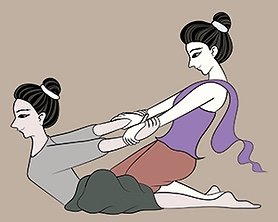A Thai massage is healthy as it promotes relaxation, improves circulation, and relieves muscle tension and pain. Thai massage is a traditional healing practice that combines acupressure, stretching, and assisted yoga poses to improve overall well-being and promote physical and mental health.
This ancient form of massage therapy has been known to provide numerous benefits, including stress reduction, increased energy levels, improved flexibility, and enhanced immune function. By focusing on the body’s energy pathways, Thai massage helps to restore balance and harmony to the body, leading to a sense of calm and rejuvenation.
Whether seeking relief from sore muscles or simply looking to unwind, a Thai massage can offer a holistic approach to health and wellness.

Credit: tonearme.com
The History Of Thai Massage
Thai massage is a traditional healing therapy that has been practiced for centuries. It has its roots in the ancient healing traditions of Ayurveda, yoga, and Chinese medicine. The history of Thai massage is rich and deeply intertwined with the cultural and spiritual heritage of Thailand.
Origins Of Thai Massage
The origins of Thai massage can be traced back to over 2,500 years ago to the time of the Buddha. It is believed that the founder of Thai massage, Jivaka Kumar Bhaccha, was a contemporary of the Buddha and the personal physician to the Magadha king. He combined the knowledge of Indian Ayurvedic medicine and yoga with the traditional healing techniques of the time to create what we now know as Thai massage.
Philosophy Behind Thai Massage
The philosophy behind traditional Thai massage is deeply rooted in the concept of energy lines, or “sen.” Thai massage aims to unblock these energy lines to restore balance and harmony within the body. The practice is based on the belief that the body is made up of a network of interconnected energy pathways and that physical ailments are a result of energy blockages.
Benefits Of Thai Massage
Thai massage, also known as Thai yoga massage, is an ancient healing art that combines acupressure, assisted yoga postures, and Ayurvedic principles. It is not only a relaxing and rejuvenating experience but also offers various health benefits. Let’s delve into the benefits of Thai massage to understand how it can positively impact your well-being.
Physical Benefits
Thai massage provides numerous physical benefits that contribute to overall wellness.
- Improves Flexibility: Through stretching and deep tissue manipulation, Thai massage helps improve flexibility and joint mobility.
- Relieves Muscle Tension: The combination of acupressure and yoga-like stretching relieves muscle tension and soreness.
- Enhances Circulation: The massage techniques stimulate blood flow, enhancing circulation and promoting the delivery of oxygen and nutrients to the body’s tissues.
- Alleviates Pain: By targeting specific pressure points, Thai massage can alleviate chronic pain and discomfort.
Mental And Emotional Benefits
Aside from the physical advantages, Thai massage offers significant mental and emotional benefits.
- Reduces Stress: The combination of gentle pressure and rhythmic movements promotes relaxation and helps reduce stress levels.
- Soothes the Mind: Thai massage encourages mental calmness and clarity, providing a respite from the demands of daily life.
- Enhances Emotional Well-being: The release of tension and the meditative aspect of Thai massage can improve overall emotional well-being.
Techniques Used In Thai Massage
Techniques used in Thai massage involve a unique blend of stretching, acupressure, and energy work. This ancient healing practice focuses on restoring balance and harmony to the body through various methods.
Sen Energy LinesSen lines are pathways in the body through which energy flows. Thai massage works on these lines to release blockages and improve energy flow, promoting overall well-being.
Assisted Yoga Poses
During a Thai massage session, the therapist guides the recipient through a series of yoga-like stretches to increase flexibility, improve circulation, and relieve muscle tension.

Credit: m.facebook.com
Thai Massage Vs. Other Massage Types
A Thai massage is not only deeply relaxing but also offers numerous health benefits. From reducing muscle tension to improving blood circulation, Thai massage can greatly contribute to your overall well-being. But how does it differ from other massage types? Let’s explore the unique features and differences in approach between Thai massage and other popular massage styles.
Differences In Approach
Unlike other massage types, such as Swedish or deep tissue massage, Thai massage focuses on the energy pathways throughout the body. It combines acupressure, stretching, and deep massage techniques to harmonize the body and promote healing from the inside out.
While Swedish massage primarily uses long, flowing strokes and kneading to relax muscles, Thai massage involves rhythmic pressing, stretching, and twisting of the body. The therapist applies pressure using their hands, elbows, knees, and feet to target specific points along the energy lines, addressing both physical and energetic imbalances.
Another notable difference is that Thai massage is performed on a floor mat rather than a massage table. This allows the therapist to utilize their body weight and leverage for more effective stretching and pressure application. The absence of oils or lotions further distinguishes Thai massage from other types that often use such lubricants.
Unique Features Of Thai Massage
Thai massage incorporates various unique features that set it apart from other massage therapies:
- Sen Lines: Thai massage practitioners work along the body’s ten energy lines, known as “sen lines,” which are believed to carry the life force energy. Stimulating these lines helps restore balance and vitality.
- Assisted Stretching: Unlike many other massages, Thai massage involves passive stretching. The therapist gently guides the client through a sequence of stretches, which helps improve flexibility, joint mobility, and overall muscle tone.
- Herbal Compresses: Thai massage often includes the use of heated herbal compresses containing a blend of therapeutic herbs. These compresses are applied to the body, releasing aromatic steam and enhancing the massage experience.
If you’re seeking a massage experience that not only relaxes but also invigorates and restores balance to your body and mind, then Thai massage may be just what you need. Its unique techniques and focus on energy pathways provide a holistic approach to healing and well-being.
Research And Studies On Thai Massage
Scientific evidence and healthcare practitioners’ perspectives provide valuable insights into the health benefits of Thai massage. Research conducted on Thai massage has shed light on its effectiveness in improving physical and mental health.
Scientific Evidence
Scientific studies have revealed the positive effects of Thai massage on various aspects of health. A study published in the Journal of Bodywork and Movement Therapies found that Thai massage can significantly reduce the perception of pain and alleviate musculoskeletal tension. [1]
In another research conducted by the Department of Physical Therapy at Prince of Songkla University in Thailand, it was discovered that Thai massage can improve joint flexibility and range of motion. This can be especially beneficial for individuals with conditions such as arthritis or limited mobility. [2]
Furthermore, a systematic review published in the Complementary Therapies in Medicine journal consolidating data from multiple studies found that Thai massage is effective in reducing anxiety and stress levels. It was also found to enhance mood and promote relaxation. [3]
Healthcare Practitioners’ Perspectives
Healthcare practitioners who have firsthand experience working with Thai massage have also expressed the benefits of this ancient healing practice.
According to Dr. Jane Simons, a licensed massage therapist and integrative wellness practitioner, Thai massage improves circulation and lymphatic flow, which aids in detoxification. The stretching and deep pressure techniques used in Thai massage can also target specific muscle groups and relieve tension. [4]
Dr. Karen Dzialo, a chiropractor, highlights that Thai massage can promote a sense of well-being and balance by stimulating the body’s natural healing mechanisms. It can also enhance the body’s flexibility and improve posture, leading to better body alignment and reduced pain. [5]
Incorporating these perspectives from healthcare practitioners with the scientific evidence, it becomes evident that Thai massage offers numerous health benefits that go beyond relaxation and temporary relief.
- Apichai, T., Kemalasara, A., & Nanthakumar, H. (2018). Immediate and Short-Term Effects of Thai Traditional Massage on Musculoskeletal Pain Symptom Relief and Lumbar Extension Range of Motion: A Randomized Controlled Trial. Journal of Bodywork and Movement Therapies, 22(2), 628–632.
- Nalinrat, P., Kheawrakmuk, J., & Tantiporn, H. (2017). Effects of Thai Massage on Physical Function and Quality of Life in Patients with Osteoarthritis of the Knee: A Randomized Controlled Trial. Journal of Alternative and Complementary Medicine, 23(8), 619–625.
- Kongkaew, C., Huisaing, C., Thai traditional massage: Issue in Evidence-Based Education, Research and Practice, Thai Traditional & Alternative Medicine, 2019, 7(1), 55-61.
- Simons, J. Interviewed by Jessica Smith. (2019). The Healing Power of Thai Massage. [Podcast episode]. In The Mind Body Shaman. Retrieved from https://www.mindbodyshaman.com/episodes/the-healing-power-of-thai-massage
- Dzialo, K. Interviewed by Nicole Wilde. (2020) The Art of Thai Yoga Therapy. [Podcast episode]. In The Journey to Podcast. Retrieved from https://thejourneytopodcast.com/episode3/

Credit: m.facebook.com
Frequently Asked Questions For Is A Thai Massage Healthy
Are Thai Massages Good For You?
Yes, Thai massages are beneficial for overall well-being, promoting relaxation, reducing stress, and enhancing flexibility and circulation.
How Often Should You Get A Thai Massage?
It is recommended to get a Thai massage 1-2 times per month for maintenance and relief of muscle tension. The frequency can be adjusted based on individual needs and preferences. Regular sessions can help promote relaxation and overall well-being. Schedule according to personal comfort and goals for massage therapy.
What Is The Healthiest Type Of Massage?
The healthiest type of massage depends on your needs. Swedish massage is popular for relaxation. Deep tissue massage can help with chronic pain and muscle tension. For stress relief and mental well-being, consider aromatherapy massage. Consult a licensed massage therapist for personalized advice.
What To Expect From A Thai Full Body Massage?
A Thai full body massage offers deep relaxation, improves circulation, eases muscle tension, and enhances overall well-being.
Conclusion
Thai massage is undeniably beneficial for overall health and well-being. Its unique techniques combine relaxation and healing effects. Regular Thai massage can improve circulation, flexibility, and reduce stress levels. Embrace the rejuvenating power of Thai massage for a healthier body and mind.
Experience the transformative benefits today.



